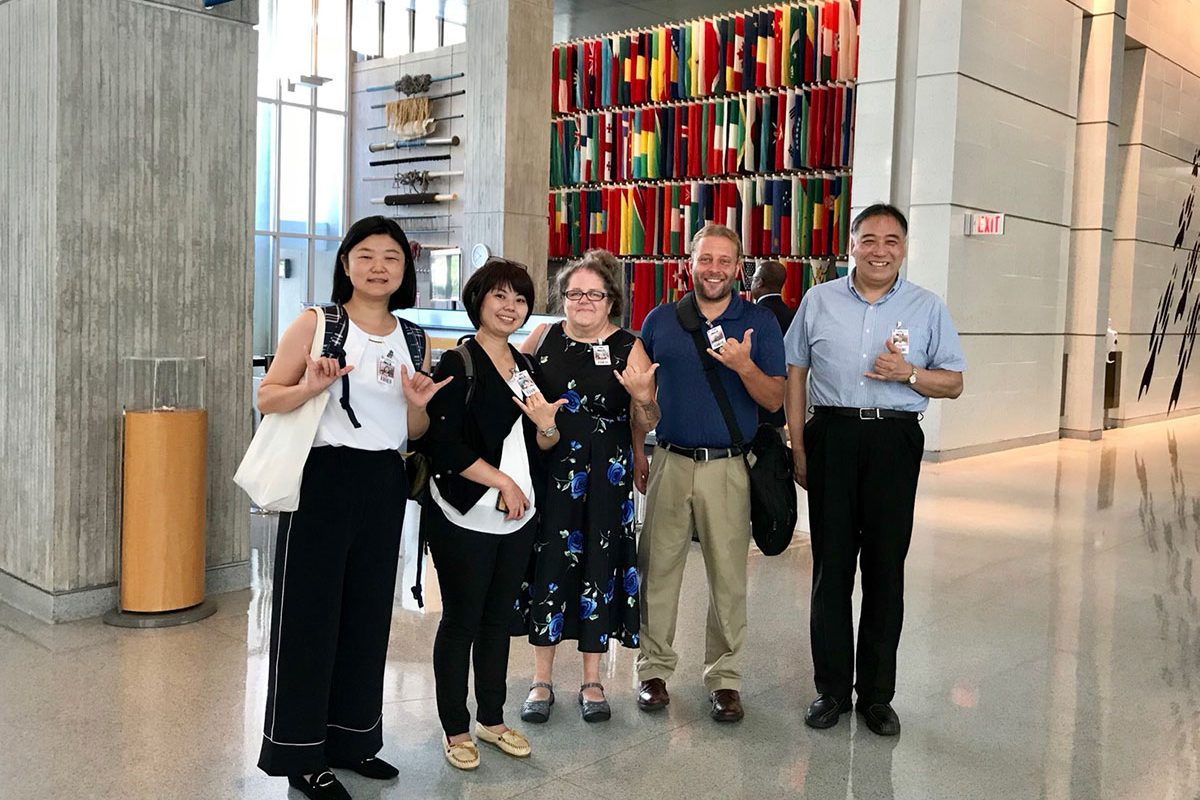MEd, Educational Foundations
This program leads to a Master of Education in Educational Foundations with a specialization in Global Perspectives on Educational Policy and Practice. This program is designed to prepare individuals in a range of positions to meaningfully incorporate global perspectives into their professional practice—including classroom teachers, school leaders, school system administrators, higher education practitioners and administrators, athletics coaches, study abroad facilitators, community leaders, education analysts, researchers, and professionals working in non-profit or non-governmental organizations. This unique master’s program examines how the interaction of global and local forces related to culture, technology, economics, and politics affects education policy and practice in a multitude of ways from early childhood education through advanced graduate studies. As the interaction and effects of global-local forces continue to manifest and evolve, the insights gained are not only essential for professionals across every level of education but also across geographic regions, from the United States to the Asia-Pacific region and beyond.
Globalization presents challenges and opportunities by making the world more economically interconnected, by facilitating the dissemination of ideas and knowledge, by encouraging the movement of peoples, by creating new political bodies that create education policies at the supranational level, and by placing new pressures on local communities and national economic systems—all of which has major implications for education. A key feature of this master’s is that it goes beyond a focus on understanding these dimensions of globalization to also provide program participants with tools, frameworks, lessons, and strategies that can be adapted to numerous educational and organizational contexts. There are valuable resources embedded in this program that can help you improve your practice—and the practices of your organization—whether you are a classroom teacher, a school leader, a higher education professional, a school system administrator, or any of the other professional positions mentioned above. The courses in this program will focus on topical issues that are common to all educational systems and are appropriate for education professionals in diverse geographical locations. As indicated by the course titles further below, the courses focus, among other things, on how to understand the effects of globalization on education; how to analyze and improve education policy (and organizational policy more generally); drawing lessons from the educational policies and practices of a range of countries; critically understanding multiculturalism and diversity; analyzing education from a “systems” perspective that emphasizes the interaction, complexity, and dialectical feedback loops that characterize the relationship between system components and the system as a whole; and examining the strategies and responses of teachers, principals, higher education professionals, organizational leaders, and communities when it comes to how they “internationalize” their curricula, leadership, and programmatic activities.
Because this program focuses on policy dynamics, educational practice, and organizational responses to contemporary contextual challenges, it is ideal for students and professionals working in a range of institutional or community contexts. This is furthermore the case because the cumulative project for this program is designed in conjunction with feedback from the student’s advisor. In other words, the final project responds to the student’s interests. Through this project, students are encouraged to draw on the content, resources, and lessons from their classes as they deepen their understanding of key issues, acquire new skills, or create resources (e.g., curriculum units, program evaluations, service projects, etc.) that will serve them after the completion of the program. See here for more about the various forms that the final project can take.
Join a vibrant community of exceptional scholars and professionals from continental North America, Hawai‛i, and Asia to explore the world of educational policy and practice through a lens that connects the local and global. The online program features a mix of innovative strategies for engagement that include both synchronous and asynchronous participation. Classes will entail live video sessions. Other forms of engagement are discussion boards, student presentations, group discussions, virtual posters, and group work, as well as traditional academic papers. As noted, the two-year (22 months) program leads to the production of a cumulative project, for which students work closely with a faculty person during the second year.
To learn more about some of the students who have completed this program in the past, see here and here.
Information session recording: Please click here to access the recording of an information session detailing our degree programs.
Note: This program will welcome its next cohort in Fall 2026.
Virtual Information Sessions
Join us for sessions on 10/25/24 at 3:30-4:30pm. A recording will be posted for those who missed the session!
View Announcement
Who should consider this program
This program is designed to prepare individuals in range of positions to meaningfully incorporate global perspectives into their professional practice—including classroom teachers, school leaders, school system administrators, higher education practitioners and administrators, athletics coaches, study abroad facilitators, community leaders, education analysts and researchers, and professionals working in non-profit or non-governmental organizations.
Because this program focuses on policy dynamics, educational practice, and organizational responses to contemporary contextual challenges, it is ideal for students and professionals working in a range of institutional or community contexts. This is furthermore the case because the cumulative project for this program is designed in conjunction with feedback from the student’s advisor. In other words, the final project responds to the student’s interests. Through this project, students are encouraged to draw on the content, resources, and lessons from their classes as they deepen their understanding of key issues, acquire new skills, or create resources (e.g., curriculum units, program evaluations, service projects, etc.) that will serve them after the completion of the program. See here for more about the various forms that the final project can take.
Common Careers
There is no prescribed career path for individuals who complete this program, as it lends itself to career trajectories in the government, private, and non-profit sectors. Below we list examples of the positions that participants occupy or can attain through this M.Ed. track:
- Teachers may use this degree as an opportunity to internationalize their curricula teaching and pedagogical approaches. Many participants are interested, for example, in global citizenship education.
- Principals may use this degree as an opportunity to explore how to respond to increasingly diverse student populations.
- Athletics coaches may use this degree to explore strategies for working with diverse student populations, for improving their coaching practice, or for improving organizational policies.
- Higher education professionals may use this program as an opportunity to internationalize and revise programming related, for example, to study abroad, international student services, transnational university partnerships, international research collaborations, etc.
- Program officers working with non-governmental organizations inside and outside the United States may use this M.Ed. track as an opportunity to improve the cultural relevance and educational design of their school-related or community-level programs.
- Researchers and analysts can advance their careers by better understanding the intricacies of education reform, how to improve policy design, and how to ensure its implementation.
In addition to the above options, this program is good preparation for the PhD program in Global and International Education, also offered by the Department of Educational Foundations.
Admission Requirements
-
Must have graduated from an accredited, four-year institution of higher education recognized by the University of Hawai‘i at Mānoa (UHM), prior to beginning the MEd, Educational Foundations program.
-
An Undergraduate Cumulative GPA of 3.0 or higher.
-
A transcript from each post-secondary institution attended.
-
A written statement of objectives as part of your application.
-
Your resumé or CV.
-
You may also include a sample of scholarly writing for consideration with your application to this program.
-
Two (2) letters of recommendation
-
Applicants who are not native English speakers may need to take the TOEFL or IELTS, or Duolingo (Academic) tests.
For more information view the Graduate Division website.
-
International students that have been admitted are required to submit a copy of their Identification documents (i.e. Passport or Identification Card)
-
International applicants need to show proof of sufficient funding to cover all educational and living expenses
How to Apply
Application Deadlines
| Starting Semester |
dEADLINE |
| Regular Fall Admission |
Priority deadline: May 1 |
| International Students Fall Admission |
Priority deadline: May 1 |
Note: This program will welcome its next cohort in Fall 2024. We are still accepting applications.
How to Apply
Tuition & Funding
The pursuit of a Master’s Degree is a major commitment. However, the investment is probably more affordable than you might imagine—especially for participants outside of Hawai‘i. A total of 30 credits is required for this program. The fall 2024 online tuition rate is $650/credit hour.
Visit the Outreach College webpage for details regarding any supplementary fees.
There are many resources available to help graduate students pay for college, including College of Education scholarships. There are also several scholarships listed generally through the STAR website (please note that this is only accessible to students with a valid UH ID number – must be admitted as a student prior to looking for scholarships on this site) and the Financial Support section of the Graduate Division website. For more information on financial aid and additional resources, please visit the UH Manoa Financial Aid Office (finaid@hawaii.edu).
Coursework
Fall I – 6 credits
- EDEF 675 — Intro. to Education Policy Studies
- EDEF 667F — Foundations of Curriculum
Spring I – 6 credits
- EDEF 767 — Seminar on the Educational System
- EDEF 630 — Cultural Diversity in Education
Summer – 6 credits
- EDEF 678 — Approaches to Educational Inquiry – Policy Analysis
- EDEF 667B — Global Higher Education
Fall II – 6 credits
- EDEF 610 — Foundations of Educational Theory
- EDEF 649 — Field Studies for Capstone Projects
Spring II – 6 credits
- EDEF 671 — Topics in Comparative Education
- EDEF 649 — Field Studies for Capstone Projects
Culminating Project “Plan B”:
See here for more about the options for the final master’s project.



